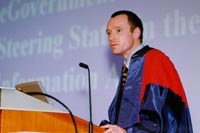Steering states in the Information Age
Simmie Magid
The
"The frenzied activity that has accompanied the recent development of the Internet, the World Wide Web, email and related advances is widely held to herald the dawning of a new age, the Information Age. Parallels are routinely drawn with the Industrial Age, now said to be slipping into history, and with transformations witnessed in all spheres of life then."
In his lecture, "eGovernment: Steering States in the Information Age", Professor Holliday discussed political issues generated by the coming of the Information Age, with a focus on the impact it's having on individuals whose core task is to steer states—"to impose some overall coherence and direction on government activity".
At one extreme, the Internet offers the promise of "digital democracy". Direct communication with representatives, and fellow citizens of the state and the world, creates opportunities for open debate and collective decision making. "At the other extreme is George Orwell's nightmare of massive state direction and control."
Professor Holliday disagrees with the postmodernists, who argue that "the Information Age will highlight and extend fragmentation of the policy process and of the state ... nobody will be able to pull things together".
"The coming of the Information Age and the coming of a more perfect market in information should lead towards better decision taking, more rational decision making," he said. "One of the issues for those who steer states is how they deal with the decentralized activity that's taking place now in many parts of the state and the public sector."
With so many websites that can be visited, "we may find ourselves listening less and less to states and more and more to each other or to other mediating institutions". This will make life more difficult for state steering agents. But a government can now put its message unfiltered into people's homes in a way that was not possible before. The Net provides states with rich resources and opportunities for co-ordination and engagement. With a substantial Web presence, "there's no reason to believe that central states are going to be massively disadvantaged".
As for
